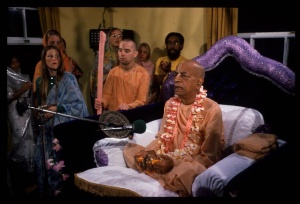CC Adi 2.74: Difference between revisions
m (1 revision(s)) |
(Vanibot #0054 edit - transform synonyms into clickable links, which search similar occurrences) |
||
| (One intermediate revision by one other user not shown) | |||
| Line 1: | Line 1: | ||
{{ | [[Category:Sri Caitanya-caritamrta - Adi-lila Chapter 02|C074]] | ||
<div style="float:left">'''[[Sri Caitanya-caritamrta|Śrī Caitanya-caritāmṛta]] - [[CC Adi|Ādi-līlā]] - [[CC Adi 2|Chapter 2: Śrī Caitanya Mahāprabhu Is the Supreme Personality of Godhead]]'''</div> | |||
<div style="float:right">[[File:Go-previous.png|link=CC Adi 2.73|Ādi-līlā 2.73]] '''[[CC Adi 2.73|Ādi-līlā 2.73]] - [[CC Adi 2.75|Ādi-līlā 2.75]]''' [[File:Go-next.png|link=CC Adi 2.75|Ādi-līlā 2.75]]</div> | |||
{{CompareVersions|CC|Adi 2.74|CC 1975|CC 1996}} | |||
{{RandomImage}} | |||
==== TEXT 74 ==== | ==== TEXT 74 ==== | ||
<div | <div class="verse"> | ||
anuvādam anuktvā tu | :anuvādam anuktvā tu | ||
na vidheyam udīrayet | :na vidheyam udīrayet | ||
na hy alabdhāspadaṁ kiñcit | :na hy alabdhāspadaṁ kiñcit | ||
kutracit pratitiṣṭhati | :kutracit pratitiṣṭhati | ||
</div> | </div> | ||
| Line 14: | Line 18: | ||
==== SYNONYMS ==== | ==== SYNONYMS ==== | ||
<div | <div class="synonyms"> | ||
''[//vanipedia.org/wiki/Special:VaniSearch?s=anuvādam&tab=syno_o&ds=1 anuvādam]'' — the subject; ''[//vanipedia.org/wiki/Special:VaniSearch?s=anuktvā&tab=syno_o&ds=1 anuktvā]'' — not stating; ''[//vanipedia.org/wiki/Special:VaniSearch?s=tu&tab=syno_o&ds=1 tu]'' — but; ''[//vanipedia.org/wiki/Special:VaniSearch?s=na&tab=syno_o&ds=1 na]'' — not; ''[//vanipedia.org/wiki/Special:VaniSearch?s=vidheyam&tab=syno_o&ds=1 vidheyam]'' — the predicate; ''[//vanipedia.org/wiki/Special:VaniSearch?s=udīrayet&tab=syno_o&ds=1 udīrayet]'' — one should speak; ''[//vanipedia.org/wiki/Special:VaniSearch?s=na&tab=syno_o&ds=1 na]'' — not; ''[//vanipedia.org/wiki/Special:VaniSearch?s=hi&tab=syno_o&ds=1 hi]'' — certainly; ''[//vanipedia.org/wiki/Special:VaniSearch?s=alabdha&tab=syno_o&ds=1 alabdha]-[//vanipedia.org/wiki/Special:VaniSearch?s=āspadam&tab=syno_o&ds=1 āspadam]'' — without a secure position; ''[//vanipedia.org/wiki/Special:VaniSearch?s=kiñcit&tab=syno_o&ds=1 kiñcit]'' — something; ''[//vanipedia.org/wiki/Special:VaniSearch?s=kutracit&tab=syno_o&ds=1 kutracit]'' — anywhere; ''[//vanipedia.org/wiki/Special:VaniSearch?s=pratitiṣṭhati&tab=syno_o&ds=1 pratitiṣṭhati]'' — stands. | |||
</div> | </div> | ||
| Line 21: | Line 25: | ||
==== TRANSLATION ==== | ==== TRANSLATION ==== | ||
<div | <div class="translation"> | ||
“‘One should not state a predicate before its subject, for it cannot thus stand without proper support.’ | “‘One should not state a predicate before its subject, for it cannot thus stand without proper support.’ | ||
</div> | </div> | ||
| Line 28: | Line 32: | ||
==== PURPORT ==== | ==== PURPORT ==== | ||
<div | <div class="purport"> | ||
This rhetorical rule appears in the Ekādaśī-tattva, Thirteenth Canto, in connection with the metaphorical use of words. An unknown object should not be put before the known subject because the object has no meaning if the subject is not first given. | This rhetorical rule appears in the ''Ekādaśī-tattva'', Thirteenth Canto, in connection with the metaphorical use of words. An unknown object should not be put before the known subject because the object has no meaning if the subject is not first given. | ||
</div> | </div> | ||
__NOTOC__ | |||
<div style="float:right; clear:both;">[[File:Go-previous.png|link=CC Adi 2.73|Ādi-līlā 2.73]] '''[[CC Adi 2.73|Ādi-līlā 2.73]] - [[CC Adi 2.75|Ādi-līlā 2.75]]''' [[File:Go-next.png|link=CC Adi 2.75|Ādi-līlā 2.75]]</div> | |||
__NOTOC__ | |||
__NOEDITSECTION__ | |||
Latest revision as of 18:49, 19 February 2024
Śrī Caitanya-caritāmṛta - Ādi-līlā - Chapter 2: Śrī Caitanya Mahāprabhu Is the Supreme Personality of Godhead

His Divine Grace
A.C. Bhaktivedanta Swami Prabhupada
A.C. Bhaktivedanta Swami Prabhupada
TEXT 74
- anuvādam anuktvā tu
- na vidheyam udīrayet
- na hy alabdhāspadaṁ kiñcit
- kutracit pratitiṣṭhati
SYNONYMS
anuvādam — the subject; anuktvā — not stating; tu — but; na — not; vidheyam — the predicate; udīrayet — one should speak; na — not; hi — certainly; alabdha-āspadam — without a secure position; kiñcit — something; kutracit — anywhere; pratitiṣṭhati — stands.
TRANSLATION
“‘One should not state a predicate before its subject, for it cannot thus stand without proper support.’
PURPORT
This rhetorical rule appears in the Ekādaśī-tattva, Thirteenth Canto, in connection with the metaphorical use of words. An unknown object should not be put before the known subject because the object has no meaning if the subject is not first given.